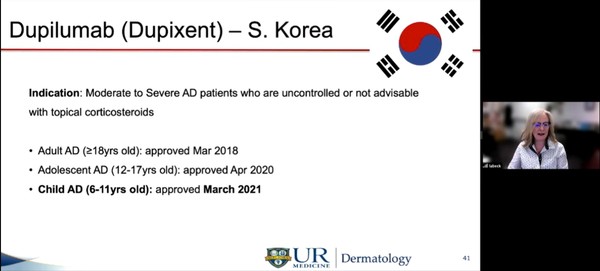Sanofi-Aventis Korea said Monday that it has confirmed the safety profile of atopic dermatitis (AD) treatment Dupixent (ingredient: Dupilumab) in clinical studies and expanded its indication to children 6 to 11 years old.

The Ministry of Food and Drug Safety decided to approve expanding the indication of Dupixent based on the phase 3 LIBERTY AD PEDS study on 367 pediatric patients with severe atopic dermatitis aging from six to 11, the company said in a news release on Monday.
Dupigent showed rapid skin lesions improvement within 16 weeks when administered once every two or four weeks, depending on their body weight.
Pediatric AD patients require more attention in long-term use of steroid-based or immunosuppressant drugs because they accompany adverse reactions even in adults, stressing the significance of safety and tolerability profile, according to the company.
About 75 percent of AD patients who received combined Dupixent plus topical corticosteroid administration showed 75 percent improvement in lesion extent and severity (EASI-75), while the placebo group only showed 26.8 percent.
The company also saw a significant and immediate improvement in itchiness, anxiety, sleep, and quality of life of those who took Dupixent.
Dermatology Professor Lisa Beck at the University of Rochester Medical Center explained that moderate and severe AD is a severe disease tormenting patients with itchiness, sleep disorders, mental problems, poor quality of life.
Professor Beck said the disease follows with patients’ growth and shows a high possibility of developing type-2 inflammatory pathways, including asthma.
Beck added that there had been unmet needs of patients lacking safe, targeted treatment options despite the importance of timely treatment. The professor stressed that pediatric AD patients and their guardians would benefit from the expanded indication of Dupixent.
“The fact that Dupixent is very effective and helps with the itch quickly was noticeable as the child suddenly started to sleep better, focus at school better, participate in sports previously unable to do so due to sweat, playing with friends more,” Beck said. “We have been hearing positive reports from the patients’ families, which is very rewarding.”
Park Hee-kyung, the representative of Sanofi Aventis Korea’s rare disease business, also said, “We are glad to provide a therapeutic option for pediatric AD patients following adolescents and adults.”
Park emphasized that Dupixcent has obtained indications for chronic rhinosinusitis accompanied by asthma and nasal polyps. The company would improve the treatment environment for more patients by expanding its type 2 inflammatory disease portfolio.

